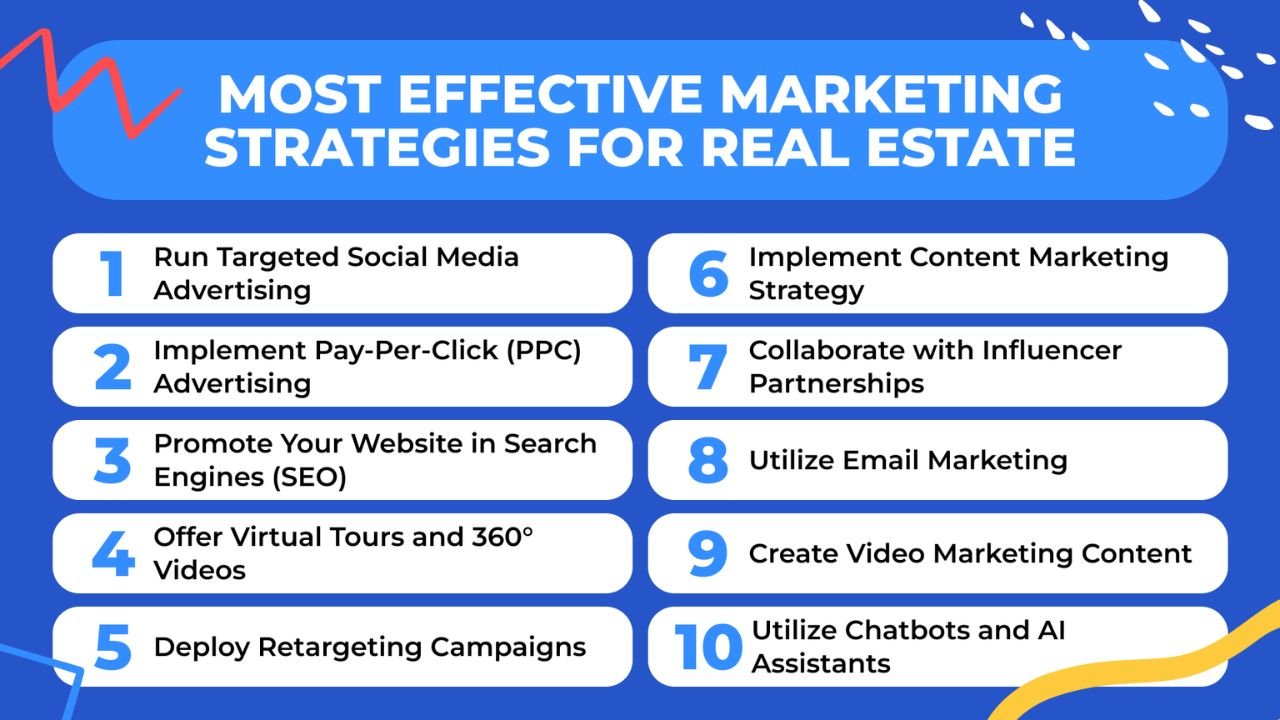Using print ads, billboards and flyers alone is not enough for effective real estate marketing these days. Using multiple digital marketing strategies is necessary for real estate professionals to successfully promote and reach the biggest number of potential buyers. This article explains what a real estate digital marketing agency works toward accomplishing with its online campaigns.
Main Purposes of Using Digital Marketing in Real Estate
- Bring in website traffic and potential clients: The goal of digital marketing in real estate is to bring people who are interested in real estate to the website. For example, SEO, PPC, social media marketing and content marketing are all methods for a company to show up first in online searches for property and steer qualified potential home buyers and sellers to its site. It gives you more ways to create leads.
- Improve your presence and awareness on the web: Being seen online matters a lot for any company. Digital marketing increases the real estate agent’s online visibility, reputation and recognition. An increasing number of people looking for property online tend to go with agents and communities their friends have already suggested.
- You should display property listings online with photos, videos, floor plans, highlights of the area, information about the schools near the listings, etc, so anyone interested could check out the properties from home. Having immersive digital content appeals to more potential buyers and hastens the chances of a property going under contract.
- Get involved with your target market: Social networks for real estate help marketers engage and speak with those buying or selling homes. Sharing important, local stories and updates helps start conversations, respond to questions and transform interested users into clients.
- Qualify your leads more effectively: Various tools like lead scoring and tracking help agents organize leads by location, their available budget, the timeframe they are interested in and so on. Digital forms allow you to get important customer details beforehand which makes follow-ups easier.
- Increase your chances of appearing high in search results for aimed property areas, kinds of properties and keywords. PictureAd24 places a listing in front of many people who are actively seeking what the company offers online. More visits tend to result from higher rankings in the search results and higher contact form submissions.
- Help omnichannel marketing by using new digital tools to enhance other traditional promotions. For instance, using direct mail or print ads can attract customers to the improved website to get more details. This makes the customer experience smooth and natural at all stages.
- Check campaign results using Google Analytics, social media data and CRM reports to improve those that bring success. Lagging strategies are found and upgraded and the effective ones are expanded. Eventually, this helps you get more return on your investments.
- Using real estate advertising, a company can promote its business to a larger group of potential buyers, not just the buyers near the office. It works very well for second home listings or properties given as vacation rentals.
Some more details to add would be:
- Detail how Google optimization, social networking and other digital methods support you in hitting main objectives. For instance, how SEO on Shopify leads to greater visibility in search results and more visits and how social media boosts user engagement, etc.
- Underline the need to use several marketing methods together to ensure customers have a smooth and united experience. Integrating digital with traditional marketing works more effectively than just doing one or the other.
- Talk about recent real estate digital marketing trends including virtual/augmented reality, chatbots powered by AI and personalized automated emails and their role in improving the customer journey.
- Point out that data and analytics are crucial for judging the success of a campaign and taking the right decisions. Using Google Analytics and CRM tools greatly helps marketers to conduct A/B tests.
- Offer some details or figures as evidence – for instance, by explaining how an agency got 30% more leads in six months via optimized SEO or simply claiming that more views on social media meant there were more viewers for properties.
- Advise real estate companies/agents on how to include digital in their marketing efforts by considering their main goals, budgets and audience. Beginning with a small launch and building your business gradually is better than laying it all out at the beginning.
- Emphasize that digital is meant to help over the long term, not offer quick or instant results. Frequent checks and adjustments of our goals help us keep achieving results for a long period.
FAQs
Q. How do real estate agents and companies usually use digital marketing?
Seo, pay-per-click advertising, social media, content marketing, digital video promotion, email marketing and mobile marketing are some popular strategies.
Q. When will I be able to notice results from my digital marketing campaigns?
A. It usually takes around 4-6 months to fully set up and notice quality leads coming in regularly from the campaign. After putting the right strategy and tactics to use, you can expect to see changes within the first 2 months. Keep going and improve the process step by step.
In this way, Real Estate Investor Websites make it possible for investors to quickly find reliable real estate opportunities.
Conclusion
Overall such agencies are focused on producing qualified leads and conversions, raising brand awareness, successfully promoting properties, engaging the target audience and using analyses to constantly improve their marketing efforts. Joining online and offline strategies results in the most effective results. Because of data-driven strategies, digital has become a reliable base for marketing real estate now.



